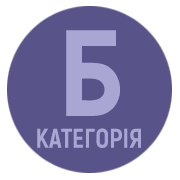THE ARTISTIC REPRESENTATION OF WAR EXPERIENCE IN DMYTRO VERBYCH’S NOVEL THE POINT OF NO RETURN
DOI:
https://doi.org/10.32782/philspu/2025.11.18Keywords:
Russian-Ukrainian war, trauma, hero, resistance, documentary basis, autobiographical elements, emotional processes and states, identityAbstract
The article explores the artistic representation of war experience in the novel The Point of No Return by Dmytro Verbych – a volunteer soldier, defender of Donetsk Airport, and civic activist. It examines how the war experience of volunteer fighters, who defended Ukraine’s territorial integrity and sovereignty in 2014–2015, is depicted in the novel.The protagonists’ decision to defend their country, the transformation of their life priorities, and the circumstances of being in combat on the front line all serve to characterize the novel’s heroes. Autobiographical elements (projected onto the image of the main character), the documentary foundation of the narrative, flashbacks, the novel’s chronotope, and deep philosophical reflections of an existential nature serve as markers that reveal the essence of lived war experience. These components enhance the overall concept of the novel, shape the characters, define the boundaries and depth of emotional processes and states, and illuminate the behavior and worldview of the protagonist and other volunteer fighters.The experience of war in Verbych’s novel is presented through perceptions of sounds, smells, and stressful situations. Flashbacks deepen character development and clarify the logic of their psychological immersion into the war. The characters are portrayed with stark realism – grappling with doubts, hesitations, and inner conflicts. Relationships among fellow soldiers are based on trust, respect, and mutual understanding. Stress, trauma, tension, and anxiety – inevitable "attributes" of war—alongside humor, which functions as a way of processing trauma, illustrate how the characters gain valuable experience in wartime conditions. The system of imagery in the novel serves as convincing evidence of the formation of a new literary concept of the Ukrainian hero in early 21st-century Ukrainian literature: a warrior-defender who, having experienced the war, asserts his identity, constructs a line of resistance to the aggressor, and forms life priorities and a worldview aligned with the challenges of the times.
References
Поліщук Я. Реактивність літератури. Київ: Академвидав, 2016. 192 с.
Матусяк А. Вийти з мовчання. Деколоніальні змагання української культури та літератури ХХІ століття з посттоталітарною травмою. Львів: ЛА «Піраміда», 2020. 308 с.
Ганна Cкоріна та Марина Рябченко про розвиток ветеранської літератури в Україні. URL: https://www.armyfm.com.ua/ganna-skorina-ta-marina-ryabchenko-pro-rozvitok-veteranskoi-literaturi-v-ukraini/
Горболіс Л. М., Лисянська В. В. Інтертекстуальність як механізм художнього моделювання культури спротиву героїв роману «Точка неповернення» Дмитра Вербича. Закарпатські філологічні студії. 2023. Вип. 29. Т. 1. С. 263–268. URL: http://zfs-journal.uzhnu.uz.ua/archive/29/part_1/29-1_2023.pdf DOI https://doi.org/10.32782/tps2663-4880/2023.29.1.49
Кеппс Р. Як писати про війну. Як розказати власну історію. Київ: Смолоскип, 2021. 159 с.
Вербич Дмитро. Точка неповернення. 2-ге вид. Київ: Наш Формат, 2022. 192 с.
«У ветеранській літературі жоден автор не змальовує образ бійця як жертви», – дослідниця ветеранської літератури Марина Рябченко. URL: https://armyinform.com.ua/2020/12/24/u-veteranskij-literaturi-zhoden-avtor-ne-zma-lovuye-obraz-bijczya-yak-zhertvy-doslidnyczya-veteranskoyi-literatury-maryna-ryabchenko/








